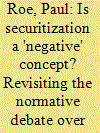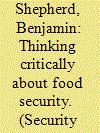| Srl | Item |
| 1 |
ID:
113727


|
|
|
|
|
| Publication |
2012.
|
| Summary/Abstract |
Minority rights conditionality has been seen by scholars as a key part of the EU enlargement process. While the focus on minority rights has largely been discussed in terms of democracy and even human rights, this article argues that conditionality was a result of the securitization of minorities rather than part of an agenda to protect or empower. In this article, we look at the methods of desecuritization as factors of 'narratives, norms and nannies'. In response to Paul Roe's conclusions about the impossibility of desecuritizing societal security, we examine whether the EU, the Organization for Security and Co-operation in Europe (OSCE) and the Council of Europe have the ability to change the societal dynamics among ethnic groups in such a way as to make the desecuritization of societal security more likely. Overall, we illustrate how a focus on 'deconstructivist' and 'constructivist' approaches to societal security has failed to make European organizations important transformative actors in interethnic relations.
|
|
|
|
|
|
|
|
|
|
|
|
|
|
|
|
| 2 |
ID:
113726


|
|
|
|
|
| Publication |
2012.
|
| Summary/Abstract |
The purpose of this article is to revisit the normatively defined debate over securitization as a negative conception. Claudia Aradau's work has largely served to define this debate, with Aradau arguing that securitization/security is an inherently negative conception inasmuch as its mode of extraordinary politics necessarily both institutionalizes fast-track decisionmaking ('process') and produces categories of enemy others ('outcome'). In making evident the main assumptions therein, my argument is that this debate has taken place not only in terms of a specific - and indeed contestable - rendering of the securitization concept, but also in terms of a more general acceptance of an essentialized (Schmittian) logic of security. The article thus seeks ultimately to demonstrate the value of de-essentializing the practices evoked by speaking security and to show how this enables meaningful engagement with other emerging conceptions of 'positive' security.
|
|
|
|
|
|
|
|
|
|
|
|
|
|
|
|
| 3 |
ID:
113724


|
|
|
|
|
| Publication |
2012.
|
| Summary/Abstract |
In current discussions, many commentators express a fear that 'broad' human security approaches are being sidelined by the rise of the 'responsibility to protect' (R2P) and the 'narrow' focus on military intervention. An alternative reading is sketched out here, which suggests that debates over 'narrow' or 'broad' human security frameworks have undertheorized the discursive paradigm at the heart of human security. This paradigm is drawn out in terms of the juxtaposition of preventive human security practices of resilience, working upon the empowerment of the vulnerable, and the interventionist security practices of liberal internationalism, working upon the protection of victims. It is suggested that human security can be conceptually analysed in terms of post-intervention, as a shift away from liberal internationalist claims of Western securing or sovereign agency and towards a concern with facilitating or developing the self-securing agency - resilience - of those held to be the most vulnerable. This approach takes us beyond the focus on the technical means of intervention - whether coercive force is deployed or not - and allows us to see how international intervention, including under the R2P, increasingly operates under the paradigm of resilience and human security, thereby evading many of the problems confronted by liberal framings of intervention.
|
|
|
|
|
|
|
|
|
|
|
|
|
|
|
|
| 4 |
ID:
113723


|
|
|
|
|
| Publication |
2012.
|
| Summary/Abstract |
This article examines the tension between food security as strategic practice and as the human insecurity of hunger. It makes the case that hunger is a security matter that warrants greater attention from security scholars, but identifies some limitations with state-centric and human security approaches. The article explores Ken Booth's 'emancipatory realism' security project as one avenue for overcoming these limitations and uses Booth's work to assist in developing a reframing of food security. It proposes redefining food security in terms of securing vulnerable populations from the structural violence of hunger, and argues that such a framing offers both conceptual and practical value for efforts to confront the problem of increasing and widespread hunger.
|
|
|
|
|
|
|
|
|
|
|
|
|
|
|
|
| 5 |
ID:
113725


|
|
|
|
|
| Publication |
2012.
|
| Summary/Abstract |
The security of civilians in contemporary conflicts continues to tragically elude humanitarians. Scholars attribute this crisis in protection to macro-structural deficiencies, such as the failure of states to comply with international conventions and norms and the inability of international institutions to successfully reduce violence by warring parties. While offering important insights into humanitarianism and its limits, this scholarship overlooks the potential of endogenous sources of protection - the agency of civilians. On the basis of a case study of northern Uganda, we identify and discuss several civilian self-protection strategies, including (a) attempts to appear neutral, (b) avoidance and (c) accommodation of armed actors, and argue that each of these is shaped by access to local knowledge and networks. We illustrate how forced displacement of civilians to 'protected villages' limited access to local knowledge and, in turn, the options available to civilians in terms of self-protection. Analyses of the intersections of aid and civilian agency in conflict zones would afford scholars of humanitarianism greater explanatory insight into questions of civilian protection. The findings from our case study also suggest ways in which aid agencies could adopt protection strategies that empower - or at least do not obstruct - the often-successful protection strategies adopted by civilians.
|
|
|
|
|
|
|
|
|
|
|
|
|
|
|
|